Today I want to talk about a key skill that any author or artist needs if they want to share their work, develop a community of supporters, and establish their platform. No, it’s not some special button on Amazon, or the secret to social media ads.
It is how to ask.
Ask for what? For anything. For attention. For someone to buy your book. To attend an event. To review your book. To be there for you when you need them the most. This is work I do every day with writers.
In considering this, I realized I learned this skill from my mom and dad. So I would like to start with an example of asking, then dig into practical tips and advice for how you can do this for yourself.
In the 1980s, my family and I had a small baseball card business. On the weekends we would set up a table at card shows and buy and sell cards with collectors. One weekend we did a show in Manhattan and one of the people signing autographs was Muhammad Ali. My mother paid for the tickets for us to meet him and waited on line with my brother and I. I was maybe 9 years old, and my brother around 13.
When we got up to the table, Ali signed autographs for us and shook our hands. I was in total awe. He was gracious and fully present.
But then, my mom, did something unexpected. She asked, “Can I take a photo of you with my boys?”
This was more than two decades before selfies were a thing, and in an era where sports shows didn’t offer photos with the celebrity guests. Ali said that there was a long line of people he didn’t want to keep waiting, but he would see what he could do later on.
Sure enough, a couple hours later, we heard an announcement over the PA system, “Would the woman who wanted to have her kids’ photos taken with Muhammad Ali please come to the front, he has to leave now.”
They took us into an empty corridor, and there in a random corner of the hotel, we began to pose to take a photo facing the camera. But then Muhammad stopped and said, “wait a minute,” he turned to me, and pretended to be throwing a punch as a pose for the photo. Here it is:
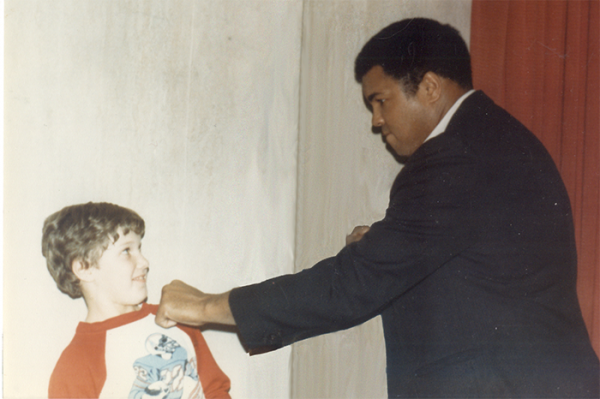
Okay, that is a (slightly) edited version of the original, which had my brother in the background, see below left. Plus he got his own photo with Ali:
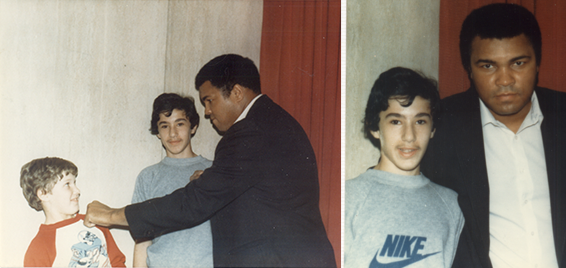
My mom did the unexpected in the moment. She took a risk and the results created one of the best moments of my life. Nowadays, this type of thing is more expected. When I met Brené Brown, I asked for a selfie and she was quick to agree:
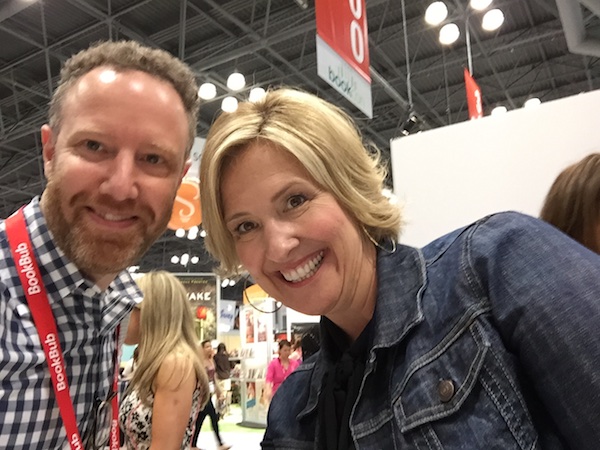
So did Amy Tan:
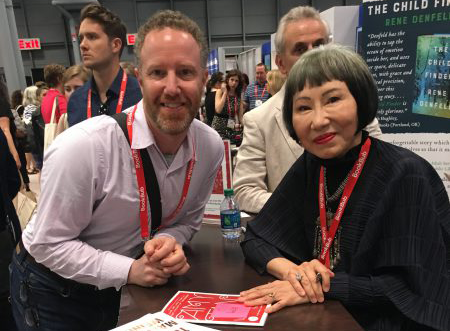
So much of marketing is not about doing the expected — the same practices as everyone else – but about doing the unexpected. I’m not talking about shock and surprise tactics, but rather, efforts that are authentic and meaningful.
Where might the skill of outreach and simply asking come in handy for a writer? Some ideas:
- Emailing another author who writers in your genre to just say ‘thank you’ and perhaps establish a connection.
- Asking for a book blurb.
- Asking an author to be a part of a virtual or in-person book event with you.
- Asking readers to subscribe to your newsletter.
- Querying an agent or publisher.
- Pitching yourself as a guest on the podcast.
- So so so so so many other aspects of what it means to be public, share your work, and develop a platform around your writing.
Too many authors wait to do these things. They wait until just before book launch. They wait for a “perfect” ask. A perfect credential. But by then, they have often waited too long to really develop the connections they need. It’s the difference between:
Opening a restaurant in a town you have lived in for years, where you have developed relationships with other business owners, town officials, and neighbors.
Vs
Flying into a town you have never even visited, and later that same day, you begin walking around town to promote a brand new restaurant you are opening.
The first way is not only more effective, but it simply feels better.
As I considered my mom and Muhammad Ali, I remembered the many ways that my parents taught me to focus on outreach, connection, and relationships as being the core of what it means to share one’s work and find success.
- My mom sold Tupperware in the mid-1970s
- My mom sold Avon in the late 1970s to early 1980s
- My parents had a stamp business in the 1970s
- My family had a baseball card business in the 1980s and 1990s
- My mom was a realtor in the 1980s and 1990s
It’s funny to consider how much of my childhood was spent behind a table at a show, watching my parents prepare orders, and joining my mom and/or dad on visits with customers and colleagues. Infused in every part of this was how they established a sense of clear communication and trust with the other person. My parents pursued these activities because they truly enjoyed them. And that meant that everything was more fulfilling when you cared about the people you were engaging with. I was able to observe thousands of asks during this time. My parents making deals, and ensuring that both they and their customers felt it was a fair trade.
Here is my family behind our table at a show (I’m on the right):
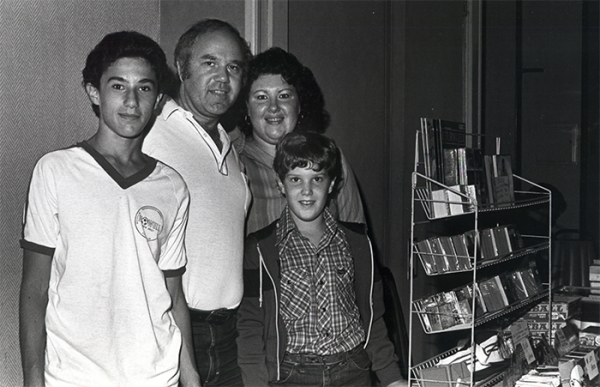
My family developed friendships that lasted years and years with customers. I can still see their faces and hear their voices; the specific customers I would expect to see at different shows we went to year after year.
These were businesses built on connections between people, and their shared appreciations for the product they were there for. I’m actually getting emotional as I write this, which means there is a strong likelihood of you seeing an upcoming post of me titled, “What Authors Can Learn About Book Launches from Selling Avon in the 1970s.”
🙂
I would imagine that in your history, you have your own versions of this. Perhaps not in side businesses that your parents ran, but with someone you knew growing up who seemed to get stuff done because they knew about the value of how to engage with other people.
While that isn’t why a lot of people start writing, I do think it is a critical part of how writing gets shared: how readers engage. With the examples above, my parents weren’t selling random goods just to make a profit. They really liked what they sold and understood how these things helped people. They were businesses built on joy, appreciation, and connection.
How can you effectively ask other people for things that support your writing? Some tips:
- Be clear. Too many people try to make the ask without ever actually asking. That usually leads to confusion and frustration.
- Focus on one ask at a time, when possible.
- Don’t hide the ask – put it up front. In other words, don’t write a 7 paragraph email, just hiding an ask in the middle of paragraph 6.
- Understand if the ask is reasonable. Is it a small, but meaningful action? What steps would the person need to take and do they understand them?
- Consider the objections the other person may have, and address them. This is not about “talking them into it,” but about empathy.
- Consider how what you are asking could align to the goals/preferences of the person you are asking. How it would be something they truly want to do.
For instance, there is a difference between emailing a friend and asking:
“I was told I have to ask people to post reviews for my book on Amazon. I know it’s a pain, but I’m trying to get a hang of this author platform thing. Anything you could post would be great.”
Vs.
“You have been such a big supporter of my writing thank you. I want to ask if you could do something important: post a review of my book on Amazon? Doing so helps potential readers know if this book is for them. It means more people who will love this book may find it.”
The first one sounds like a chore, and the second is filled with purpose for both the person asking and the person being asked. Of course, asking works in both directions. You can also reach out to a writer you know and ask, “How can I help share your writing?”
Thanks!
-Dan
